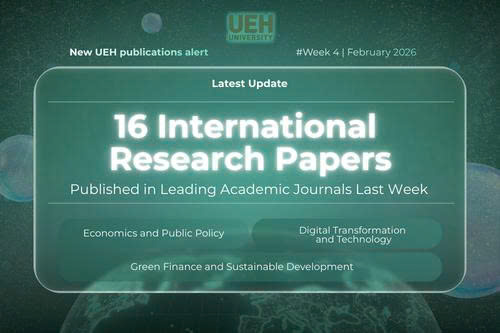Spreading Knowledge on Food Security and Sustainable Development in the Community
24 Aug, 2023
As part of its goal to evolve into a Multidisciplinary and Sustainable University, the University of Economics Ho Chi Minh City (UEH) has consistently sought to spread knowledge within the community. In 2023, UEH hosted various programs, seminars, and training sessions on food security, environmental protection, and sustainable development.
Promoting Seminars and Workshops on Food Security
The "Food Loss in the Pangasius Catfish Value Chain of the Mekong River Basin" project, funded by ACIAR and IDRC, was approved by the Ministry of Education and Training on August 26, 2022, under Decision No. 2426/QD-BGDDT. Led by the University of Economics Ho Chi Minh City (UEH) through the Health and Agricultural Policy Research Institute (HAPRI), the three-year project runs from April 1, 2023, to June 30, 2026.
The project is part of the newly established Food Loss Program of ACIAR and IDRC. The first phase of the program identifies new challenges, potentials and opportunities that will impact future food supply. The second phase plans and implements research projects that address the challenges of smallholder farmers in developing countries.
The project aims to raise awareness of food loss and waste, thereby facilitating private sector investment in reducing food loss and waste in the pangasius industry in the Mekong River Basin of Vietnam. The project will bring practical values to the beneficiaries including:
- The pangasius industry, farmers, associations and government agencies in Vietnam will benefit from the best and most efficient processes gained through understanding current food losses and waste in the pangasius value chain.
- Farmers and stakeholders will be able to address food loss and waste, and jointly design, test and evaluate high-impact options in the pangasius value chain in Vietnam.
- Women benefit directly from enhanced solutions that improve their participation in the pangasius value chain, solutions that improve livelihoods, and ensure food and nutrition security.
- Young researchers are trained to enhance their capacity in value chain and forecasting.
On July 14, 2023, University of Economics Ho Chi Minh City (UEH) organized an international workshop to launch the research project "Food loss in the catfish (pangasius) value chain in the Mekong River basin". Within the framework of the program, many important contents were discussed:
- Ms. Eleanor Dean - General Director, Communication and Capacity Building Program of ACIAR presented the importance of the ACIAR/IDRC Food Loss Research Program;
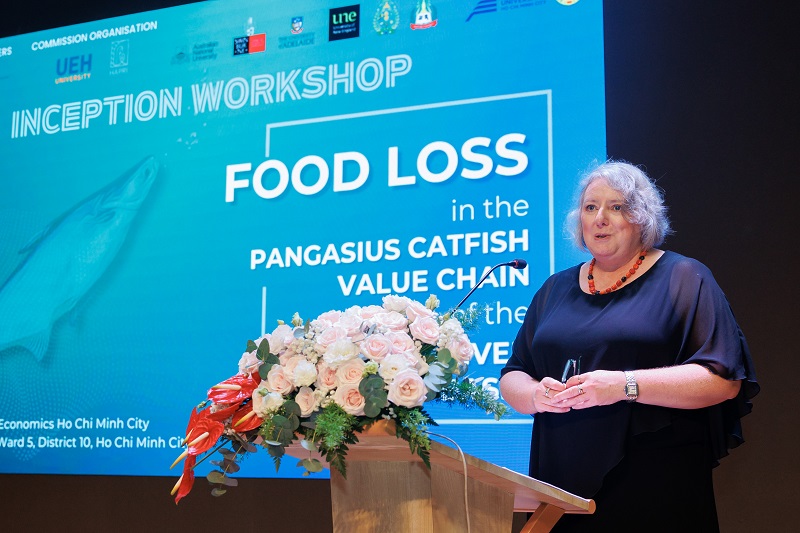
- Assoc. Prof. Vo Tat Thang - Dean of the Institute for Agricultural and Health Policy introduced key agricultural policies in the Mekong Delta and the role of the Institute for Agricultural and Health Policy in researching agricultural policy solutions;
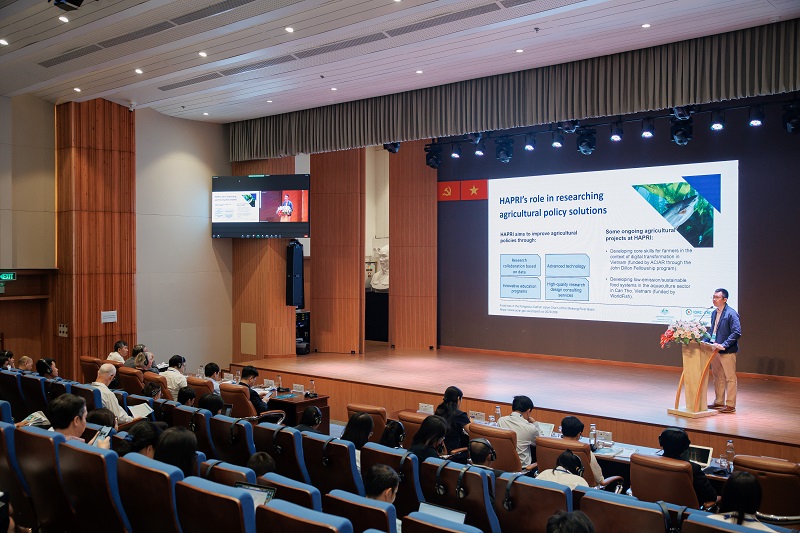
- Dr. Tran Dinh Luan - Director of the Vietnam Fisheries Department presented an overview of the role and position of the Vietnamese catfish industry: Challenges of food loss and waste in the catfish value chain in the Mekong Delta;
- Overview of the project “Food loss in the value chain of Catfish (Pangasius) in the Mekong River basin” (Associate Professor, Dr. Nguyen Van Kien - Project leader, Dean of the Institute for Agricultural and Health Policy Research/UNE; Dr. Kim Alexander - Co-leader, UNE);
- A value chain approach to assessing food loss in the catfish (Pangasius) industry (Dr. Craig Johns and Dr. Theo Simos - Global Food and Resources Center (GFAR), University of Adelaide, Australia);
- Using forecasting methods to explore the future trends, structures, institutions and dynamics of the catfish (Pangasius) value chain (Emeritus Professor Steve Cork - Australian National University & Associate Professor Magnus Moglia - Swinburne University of Technology);
- Intervention Space Solutions & Activities and MEL (Dr. Kim Alexander (co-director), University of New England, Australia;
- Gender Approach to Assessing and Enhancing Gender Roles in the Catfish (Pangasius) Value Chain (Dr. Silvia Larson - Gender Expert, University of New England, Australia);
- Current status and factors affecting food loss and waste in the catfish (Pangasius) industry in the Mekong Delta of Vietnam: A systematic literature review (Research group of the Institute of Food Science and Technology - UEH);
- Challenges of food loss and waste in the catfish industry in Laos (Assoc. Prof. Dr. Silinthone Sacklokham, National University of Laos);
- Challenges of food loss and waste in the catfish (Pangasius) industry in Cambodia (Dr. Kim Chhin SOK, Royal University of Agriculture, Cambodia);
- Challenges and potentials in the Pangasius value chain in An Giang in the current situation (Mr. Tran Anh Dung - Head of the Department of Fisheries, An Giang Province);
- Food challenges and food loss in the catfish industry in Vietnamese enterprises (Mr. Do Lap Nghiep - Deputy General Director, Nam Viet Joint Stock Company);
- Difficulties, challenges and prospects of Pangasius farming in Ben Tre province (Mr. Nguyen Van Buoi - Deputy Director of Department of Agriculture and Rural Development of Ben Tre province).
In addition, the researchers participated in independent sessions to discuss four (04) key questions of the project: What are the current losses and wastes occurring in the pangasius value chain in Vietnam, Cambodia and Laos? What are the main causes of food loss and waste in the pangasius value chain in Vietnam, Cambodia and Laos? How can women and men be empowered and improve their participation/livelihoods/food security through value chain interventions? What interventions or innovations can effectively support the pangasius value chain to reduce current and future food losses and waste?
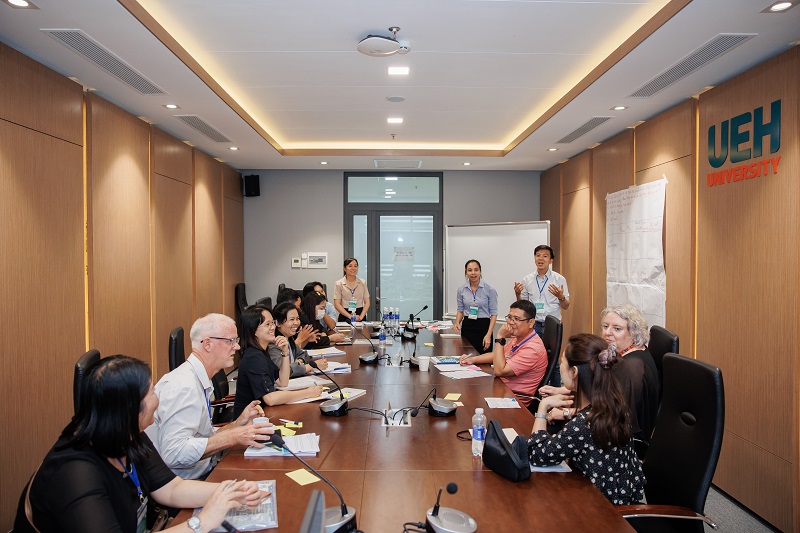
The success of the workshop laid the foundation for the project's in-depth research activities, addressing farmers' challenges and opening up new potential for future food sources.
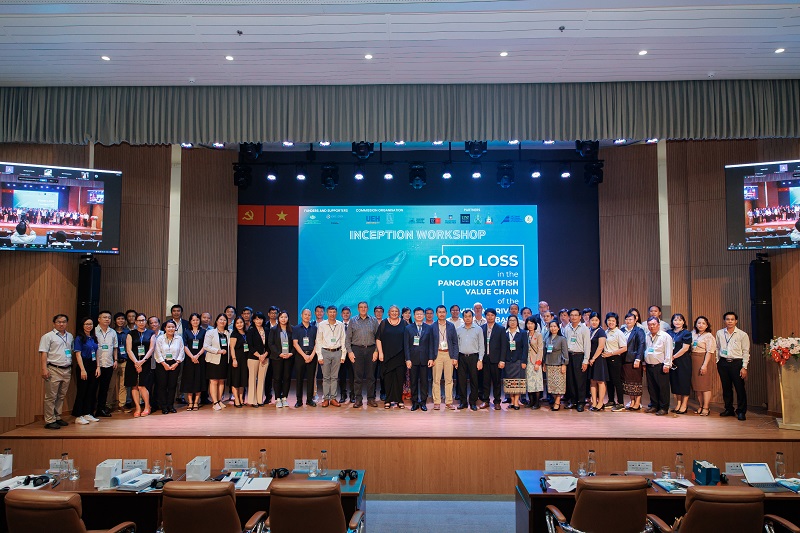
Training Programs to Disseminate Knowledge on "Innovation" to Local Communities
The project “Developing core skills for agricultural workers in the context of digital transformation in Vietnam” is implemented by domestic and foreign partners, in which the Health and Agricultural Policy Research Institute (HAPRI) under the University of Economics Ho Chi Minh City (UEH) and the Vietnam National University of Agriculture (VNUA) are the main partners. This project is funded by the Australian Center for International Agricultural Research (ACIAR) and the John Dillon Fellowship Program managed by the University of New England (UNE, Australia). The objective of the project is to develop a framework for agricultural labor capacity and core skills, identify gaps and shortages in core skills and competencies for workers; and provide information and feasible pathways to improve core skills and competencies for mango farmers in the context of digital transformation in Vietnam to serve Vietnam's mango exports in the future.
Within the framework of the project, HAPRI and VNUA conducted in-depth interviews with exporting enterprises in Son La and the Mekong Delta (MD) on mango export requirements. In addition, the Institute organized group discussions with components in the mango export chain on difficulties in the production process in general and digital transformation in agriculture in particular.
Specifically, from March 2 to 4, 2023, VNUA conducted a field survey on the cultivation situation and awareness of digital transformation in the field of growing and selling mangoes of farmers in Son La province. Representative of HAPRI Institute, Mr. Vu Ngoc Tan was also present to support the delegation in completing the questionnaire and learning from experiences to organize the survey in the Mekong Delta. After this survey, HAPRI conducted a survey of mango farmers for export in Dong Thap. The survey is expected to begin at the end of March. At the same time, VNUA will input data, clean and analyze the survey results in Son La. The survey results at the two locations will be presented in the project completion report.
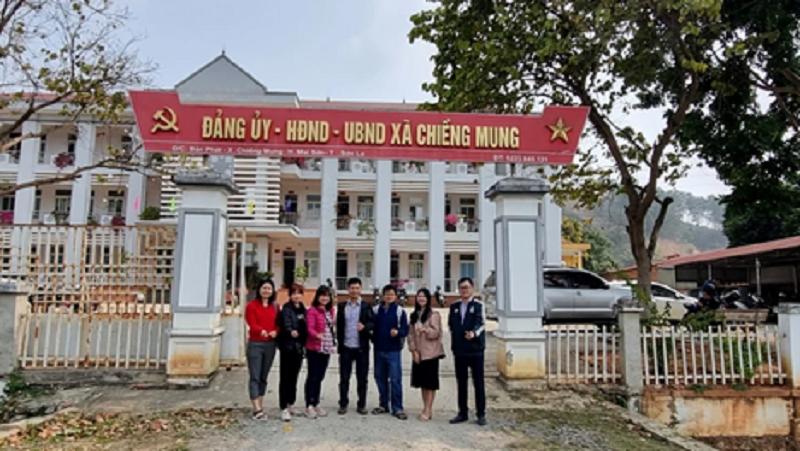
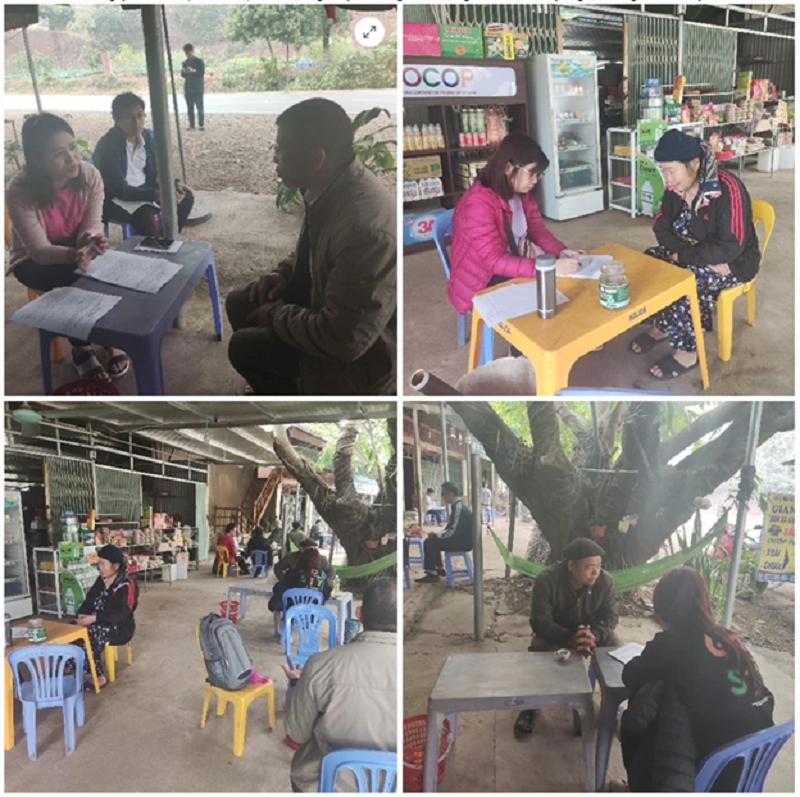
During the days in Son La province, the delegation conducted exchanges and surveys with mango growers in Mai Son and Yen Chau districts. With the support of local officials and village chiefs at the research site, representatives of farmers growing and selling mangoes in Hat Lot and Chieng Mung communes of Mai Son district and Chieng Hac and Sap Vat communes of Yen Chau district.
During the sessions, the survey team shared and listened to the wishes of mango growers and sellers about the difficulties in cultivation, as well as in the use of technological facilities in the digital transformation process. The research team also appreciated the cooperation and support of the government and people of Son La province to successfully complete this survey.
In Dong Thap, from February 16-17, 2023, HAPRI organized 02 group discussions in Cao Lanh district and Cao Lanh city to serve the project "Developing core competencies and skills for agricultural workers in the context of digital transformation in Vietnam". The project is part of the institute's series to promote digital transformation in agriculture and health in Vietnam.
Mr. Vu Ngoc Tan, a researcher at HAPRI, a key member of the project, had a meeting with Mr. Nguyen Khac My, leader of the Agricultural Service Center (ASC) of Cao Lanh district, Mr. Le Chi Hieu, leader of the ASC of Cao Lanh city, farmer Nguyen Van Mach (Vice Chairman of Minh Tam Association), Mr. Vo Tan Bao (Director of Tinh Thoi ASC), and representatives of farmers and the Farmer Association at My Xuong Cooperative, Cao Lanh district and Tinh Thoi Cooperative, Cao Lanh city. The meeting aimed to learn about the current production situation, the linkage between actors in the mango export chain and awareness of digital transformation in the locality.
Currently, My Xuong Cooperative and Tinh Thoi Cooperative are two key mango producing localities in Dong Thap. The three main types of mango grown include Cat Chu mango, Hoa Loc mango, and green-skinned Tuong mango, of which Cat Chu mango accounts for the majority of total output. The two cooperatives are piloting electronic diaries to serve farm management and traceability. In addition, My Xuong Cooperative is also piloting an automatic sprinkler irrigation system and Tinh Thoi Cooperative is starting to apply organic production, aiming to improve soil and product quality, gradually reducing chemical fertilizers, increasing organic fertilizers, and using drugs to replace chemical drugs.
UEH Students Supporting Sustainable Farming and Environmental Awareness
Within the framework of the Economic Student Volunteer Campaign 2023, UEH actively spread knowledge with the topics of "for the environment", "digital transformation", "social security", cultural and artistic exchanges, sports, awarding scholarships to disadvantaged children, organizing summer review classes, summer activities to serve and improve the spiritual life of local people and youth, specifically including
- The theme "volunteering for the environment" with 9 activities attracted 690 children to participate in performances, skits and especially booths and games to educate them about environmental protection knowledge, guide them on how to classify garbage and keep their living place clean, and limit waste.
- The theme of "volunteering to participate in digital transformation" organized 12 activities on IT skills classes for high school students, instructing them on tools such as Google Sheet, Google Docx, Google Drive, etc., creating conditions for them to practice and quickly become familiar with the utilities so that they can apply them to their work and daily life. These activities attracted 262 students.
- The theme "volunteering to remember the source of water when drinking and ensure social security" with 11 meaningful activities such as visiting and giving gifts to policy families in 7 communes in Mang Thit district, organizing visits and commemorations at martyrs cemeteries in each commune,... has taken care of 61 policy families.
- The training session with the topic "Innovative thinking - Startup luggage for the young generation" provided the most basic and practical knowledge on the topic of startups for 35 young participants, thereby creating a springboard for startups to grow.
- Organizing review classes, summer activities, and soft skills instruction for children in 7 communes of Mang Thit district with more than 50 sessions.
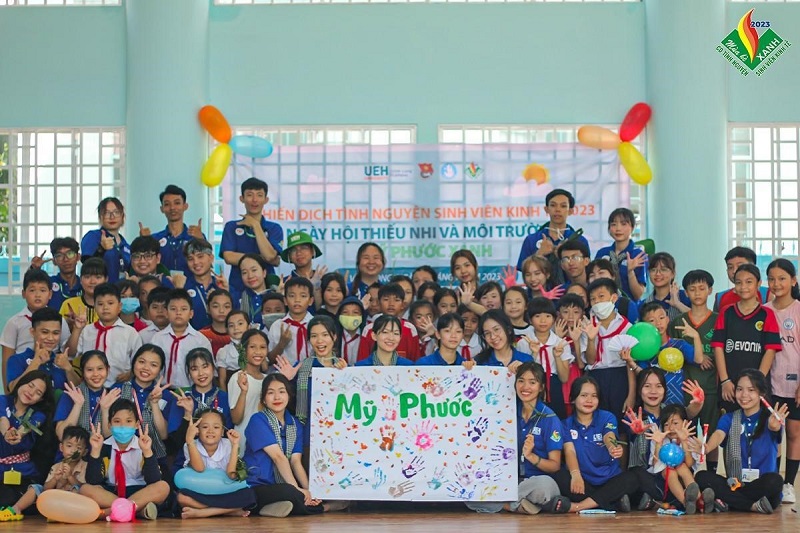
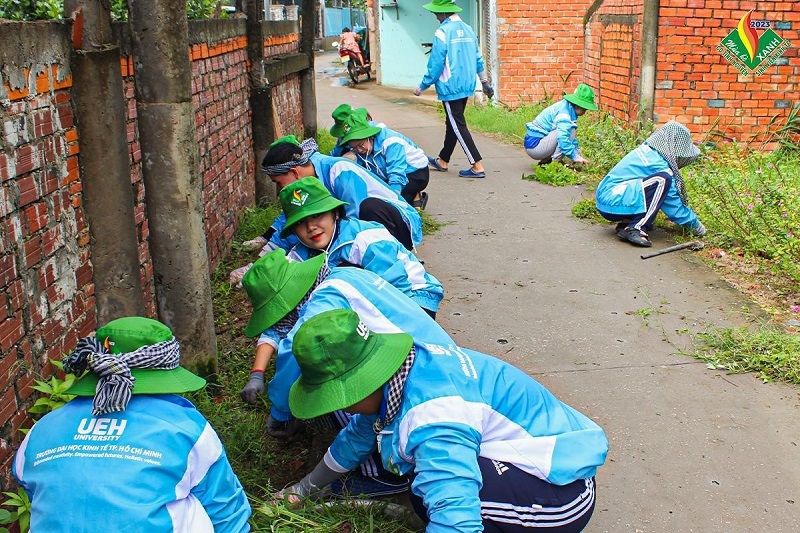
Aiming to raise awareness of the urgency of environmental issues for sustainable development, within the framework of the Campaign, 03 projects to prevent plastic waste in Mang Thit were implemented. At the same time, human resources were supported to clear, clean and take care of the 63,300m long flower roads across 07 communes.
Through these efforts, UEH has demonstrated its commitment to spreading essential knowledge on food security, sustainable agriculture, and community development, contributing to a better future for all.
News and photos: Department of Marketing and Communications, Department of Research Management - International Cooperation

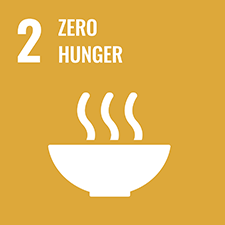
![[Research Contribution] Sustainable Manufacturing: A Driving Force for the Green Economy and the Challenges Ahead](/images/upload/thumbnail/ueh-thumbnail-639082294182922007.png)

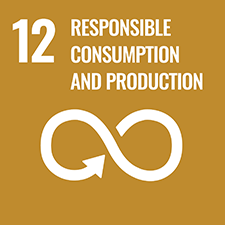
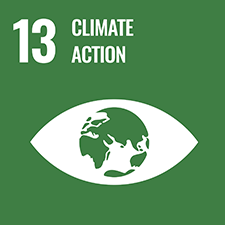
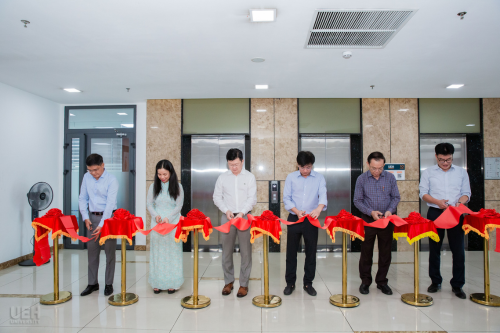


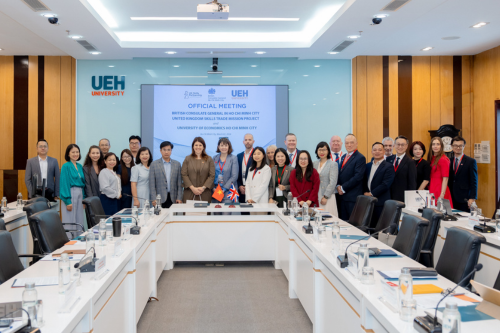


![[Research Contribution] The influence of greenwashing on green purchasing intentions in the electric motorbike sector: the mediating role of green brand trust and green word-of-mouth of GenZ](/images/upload/thumbnail/ueh-thumbnail-639081264718342243.png)
